Teacher
Professional
- Messages
- 2,669
- Reaction score
- 819
- Points
- 113

Hello! We all have problems, and these problems make us feel bad.
Therefore, to get rid of the bad feeling, we must put all our efforts into solving our problems.
At least, that's what we think.
The reality, however, is different.
If focusing on your problems and trying to solve them with all possible effort works, why do you still have so many problems?
- Why the general approach to problem solving doesn't work.
- What is the real problem?
- Alternative approach to problem solving
- But what about thinking and reason?
- But the main thing is action, isn't it?
- Do you really want to be happy?
Part of the problem is that we consciously or subconsciously believe that life is all about effort and struggle, that nothing comes without hard work, and that putting your nose to the grindstone is the only way to make a difference.
I think this is a really sad and depressing approach to life, and I'm going to argue for a different approach.
Why the general approach to problem solving doesn't work.
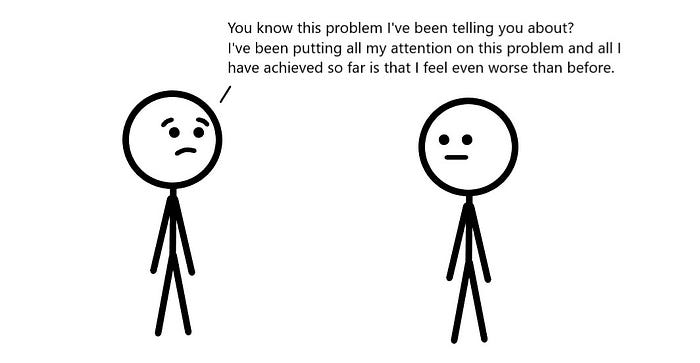
Let's start with an example that may be close to many of us.
Imagine that you are currently having problems with money. You may not even need to imagine it, because you have them right now.
Most of us have had or still have this problem. So we all know how shitty it is.
Anxiety, anxiety, and stress are all unpleasant side effects of money problems.
Now, to solve this problem, we naturally do the only thing we've been taught when it comes to problem solving: focus on it and try to find a solution.
But there are two problems with this approach to problem solving:
- Anxiety, anxiety, and stress increase.
- We rarely find a satisfactory solution.
Because lack of money is emotionally associated with anxiety, anxiety, and stress, the more we focus on it, the stronger these emotions become in our experience.
These negative emotions are the problem state we feel. We don't like this state. So now we want to move from the problem state to the solution state.
But due to the fact that our entire system is in a problematic state, we can't find a solution.
Or, in the words of Albert Einstein:
I would adapt this quote a bit and say:"We can't solve our problems with the same mindset that we used when we created them."
"We can't solve our problems in the same state of consciousness that we were in when we created them."
Often it is not a lack of effective thinking that prevents us from finding a solution to a problem, but a misdirected attention.
What is the real problem?
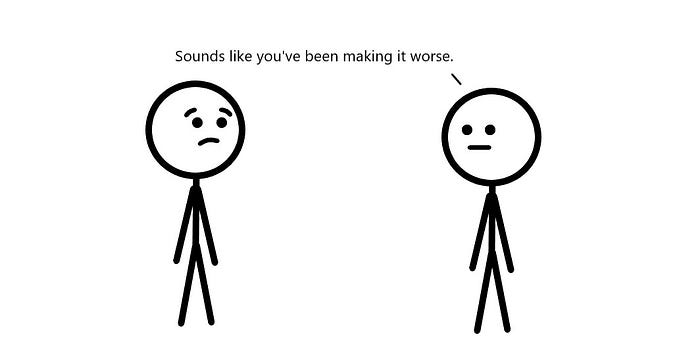
Image provided by the author
The problem is not lack of money. The problem is your emotional state.
I already hear some hardened pragmatists calling me a fool for saying such things, but bear with me.
Look at it from this angle. What is the most painful part of a money problem?
It's not a number in your bank account. These are negative emotions — anxiety, anxiety, stress, etc.
No matter what you think is wrong in the world, the only reason you interpret anything as a problem is because you feel bad about it.
And most of us in the Western world who claim to have money problems are not starving. This is usually a problem of not having a lifestyle that other people lead. But I digress.
Just imagine for a moment that you will feel absolute peace and bliss in your life, no matter what happens, will you still feel like you have an urgent problem?
And before you say it, yes, you can feel peace and bliss even without the things you think you desperately need.
The inversion is also true. If you don't believe me, look around you.
Most of us have all sorts of material comforts and comforts, but we still experience anxiety, depression, stress, anger, and so on.
Try to see this:
All the problems come down to the fact that you don't like the way you feel.
So what if changing how you feel really solves your problems?
Alternative approach to problem solving
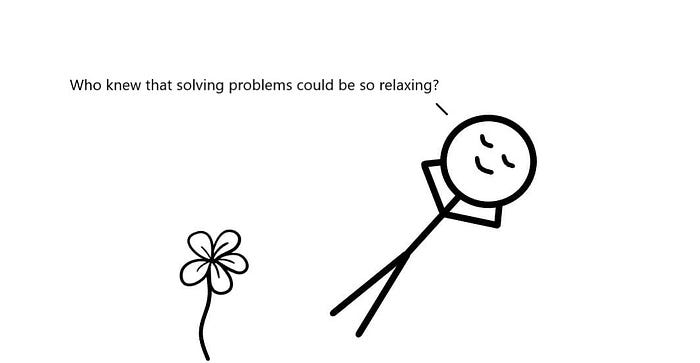
Image provided by the author
You don't like all these worries. You don't like feeling unwell. You don't like to go out of your way to solve your problems and never end up with them.
So, how about instead of focusing all your mental faculties on trying to find a solution and wallowing in your negative emotional state, you just stop?
What if you take all your attention away from the problem and focus it on something that makes you feel good?
Ask yourself how you would feel if the problem was solved, and then feel it.
Each time you find yourself sinking back into anxiety, keep returning to that feeling (such as peace, joy, happiness, abundance, etc.).
You can do this.
If you think I'm crazy for suggesting this, look at your life.
Take a look at the most pressing problem in your life and see how long you've been trying to solve it with a traditional approach. Take a look at all the misery and suffering you've been through, pondering this problem for many fruitless hours.
If endless thinking and worrying is the way to go, then why didn't you find a solution like you did two years ago?
Heck, some people spend 16 hours a day worrying.
Isn't that crazy?
Just turn it into an experiment. Approach your life differently. Instead of repeating your problems, make it your priority to feel good right now.
Close your eyes and realize that right now, in this moment, everything is fine. It's all right. Nothing needs to be done or changed.
Keep returning to the feeling of peace that you can touch at any time.
This does not mean that you need to suppress your emotions. This is what you've probably been doing for most of your life.
Feel your painful emotions and let them be, but don't waste your time justifying, magnifying, and immersing yourself in them. Don't make them bigger than they really are.
Anxiety is like an addiction. So if you're having a hard time stopping right now, give yourself 15 minutes a day to actively worry.
But there's nothing to worry about for the rest of the day. No, not even worrying about your feelings.
When you feel that your minute-to-minute experience is improving, you will happily reduce your worry time to zero.
Try it out! After all, what's the worst thing that can happen?
Your external situation remains the same, but you no longer feel bad.
I think it's all right.
But what about thinking and reason?
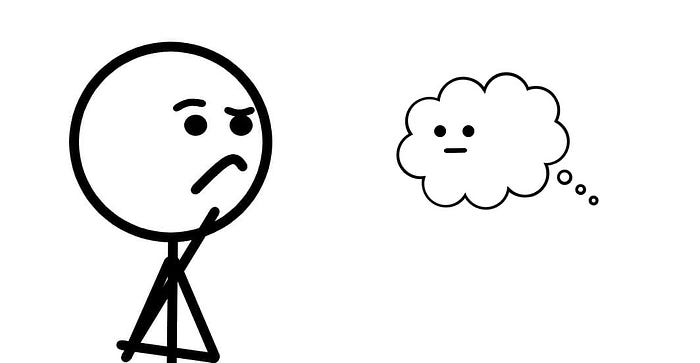
Image provided by the author
Don't get me wrong.
I'm not saying that you should give up your mind and stop thinking.
Personally, I like to think, and reason is what drives effective thinking. The problem is not thinking.
The problem is the mindless repetitive thinking that you've been doing for years. This is a type of thinking that is dictated by every emotional whim.
Effective thinking is carried out without the distorting influence of emotions.
And the reason that many of us struggle with the same problems all our lives is that all our thinking about these problems is fueled by the emotions associated with these problems, and thus are part of the problem.
So let's be rational for a moment.
Which makes more sense:
Spend your whole life worrying and worrying in the hope that your problems will eventually go away and you can feel good, and if they don't, you'll spend your life worrying and never enjoy what you already have?
Or
Do you feel as good as you can right now, and then live based on that state of mind?
Again, thinking is great. But not all thoughts are the same.
Anxiety is a form of thinking based on a negative " what if?" scripts and does nothing but destroy your well-being.
In the words of Terence McKenna, "Worrying is absurd."
But the main thing is action, isn't it?
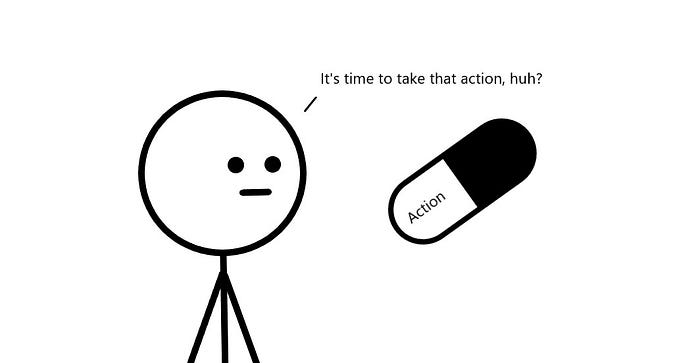
Image provided by the author
If you have a problem and you know exactly what actions you need to take to solve it, be sure to act.
But if you knew exactly what action would solve your problem, then why does it still exist?
Here's an unpopular view: action is not a solution.
No external influence can compensate for the internal displacement.
I'm not saying that actions can't solve problems. What I mean is that action will not lead you to a carefree existence.
Maybe you will work hard and, despite all your fears and worries, earn a lot of money. But then what?
Do you think that now your mind will give you slack?
Hell, no!
Now you have time to worry about losing your money, or how to invest it, or how to protect it from the government. You've solved one problem only to carefully move on to the next.
If the solution was an action, we would have already solved all the problems. Look around. People rush and struggle everywhere and don't seem to get anywhere.
You're already tired, aren't you? Then why is the solution to try even harder?
Perhaps the solution is to stop this craziness for a moment and ask yourself what you really want.
Do you really want to be happy?
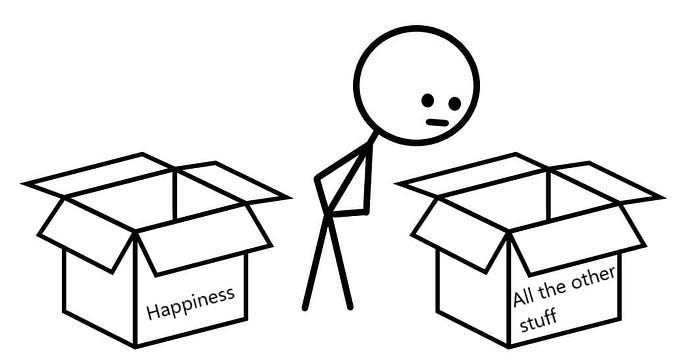
Image provided by the author
I don't care what you say. You want to be happy. Period.
And it all comes down to the realization that happiness is either now or never.
Here's a little thought experiment:
Imagine that you can be happy forever right now, but you will never get what you think you need to be happy.
You won't get a mansion, a yacht, an island, a lover, a pet giraffe, or anything else you "need" to be happy. But you will be absolutely happy.
This little thought experiment can show you that you don't want to be happy. You want to be happy with this thing.
But true happiness is not tied to anything.
Make your decision right now.
Do you want to be happy with what you think you need, or would you like to be happy no matter what?
Most of us think that we need all the stars to come together to be happy. Most of us think that happiness depends on all sorts of uncontrollable external circumstances.
And that's why many of us have a minuscule amount of happiness in our lives.
We've been brainwashed into believing that we can't be happy if the world isn't what we want it to be. Many of us believe that we should suffer together with others, as if it helps someone.
Forget all about it.
Your happiness is the greatest contribution to the world.
I can confirm from personal experience that when you approach life in this way, many problems resolve themselves in ways that you can't foresee.
And if you're still skeptical about what you've read here, then let me say something else.
Whether you believe it will solve your problems or not is irrelevant. It's just an invitation to be happy right now and see what changes in your life.

